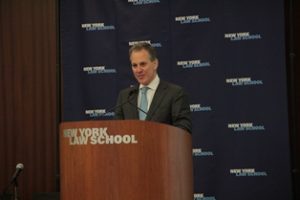
New York Attorney General Eric Schneiderman speaking at New York Law School, March 18, 2014. Image credit: CityLaw
Schneiderman announces settlement with New York City landlord accused of harassing rent-stabilized tenants. On May 4, 2017, New York State Attorney General Eric. T. Schneiderman announced that a settlement had been reached between the State and several companies controlled by Sassan “Sami” Mahfar and Sina Mahfar. The companies owned four residential buildings on Manhattan’s Lower East Side—22 Spring Street, 102 Norfold Street, 113 Stanton Street, and 210 Rivington Street. The Attorney General alleged that the companies and their principals the Mahfars had engaged in illegal methods to harass rent-regulated tenants, including dangerous construction work, failing to provide essential services, and hiring a relocation company that used illegal tactics to coerce buyouts.
According to the Attorney General, between 2013 and 2016, the Mahfars’ companies deliberately attempted to coerce their rent-stabilized tenants in the four buildings in question to move out of their apartments. As part of this coercive campaign, the companies allegedly engaged in widespread demolition and construction work in the buildings, which violated federal, state and local health and safety requirements. Inspections repeatedly found unsafe lead concentrations—at 102 Norfolk Street an inspector found lead levels as high as 40,000 and 110,000 micrograms per square foot, the NYC Health code safe limit is 40 micrograms per square foot.
The Attorney General also alleged that Misidor LLC was hired by the companies to negotiate buyouts at 22 Spring Street and 210 Rivington. Misidor repeatedly harassed and threaten tenants. In October 2014, the Attorney General announced a settlement with Misidor to cease all operations as an unlicensed tenant relocator.
The settlement between the State and the Mahfars requires $175,000 be paid to the Department of Housing Preservation and Development for lead remediation and enforcement. Another $50,000 in penalties, fees and costs will be paid to the State. The Mahfars will also be required to hire an independent management company approved by the Attorney General’s office to manage the buildings which they still own.
“Landlords must not use harassment or subject tenants to unsafe construction to drive rent-stabilized tenants out of their homes. Unfortunately, across the city, unscrupulous landlords look to take advantage of New York’s real estate market at the expense of their rent-regulated tenants—and we won’t hesitate to fight back using all tools at our disposal,” said Attorney General Schneiderman.
In April 2017, the Attorney General proposed new legislation to make it easier to criminally prosecute landlords who harass their tenants. Currently state law placed a high bar in order to criminally charge landlords.
At the City Council, the Committee on Housing and Buildings is considering a package of bills to strengthen tenant protections from harassment and increase City oversight of the problem. A hearing was held to consider the package on April 19, 2017. For CityLand’s prior coverage of this legislation, click here.
By: Jonathon Sizemore (Jonathon is the CityLaw Fellow and a New York Law School Graduate, Class of 2016).

